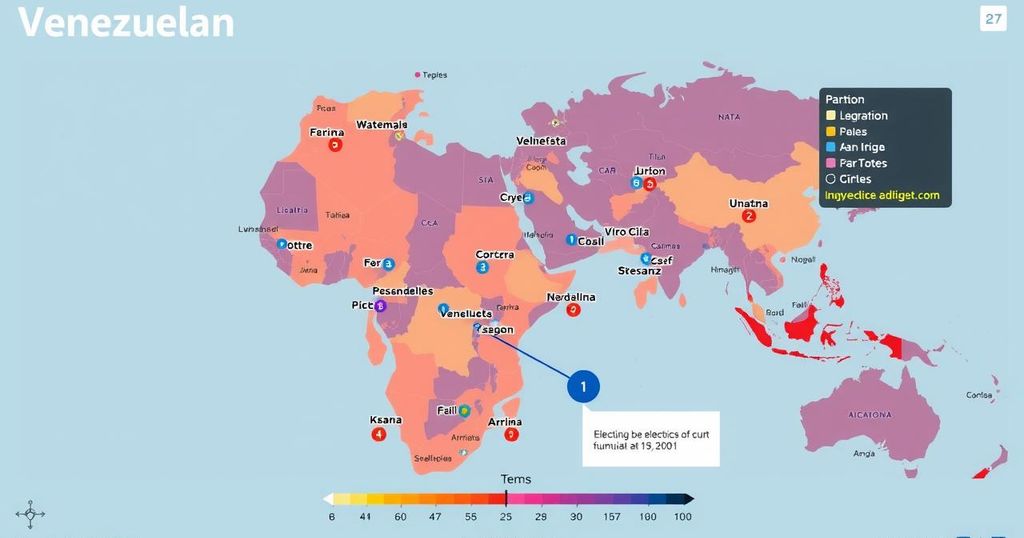In the aftermath of the 2024 Venezuelan presidential elections, both Nicolás Maduro and Edmundo González Urrutia claimed victory, leading to accusations of election fraud. The National Electoral Council endorsed Maduro, although the opposition and international community dispute the results, supporting Urrutia. The situation escalated with Urrutia’s exile amid growing calls for transparency and an investigation into the electoral process, as Maduro prepares for inauguration amid controversy.
On July 29, 2024, both Nicolás Maduro and opposition leader Edmundo González Urrutia proclaimed victory in the Venezuelan presidential election held the previous day. The National Electoral Council (CNE) backed Maduro, but the opposition and international observers have accused the CNE of fraud and lack of transparency. Millions of Venezuelans voted on July 28 with hopes for significant change, particularly after the government disqualified opposition figure María Corina Machado from running due to her support for U.S. sanctions, which placed the responsibility for this change on her proxy, González Urrutia.
Professor MJ Peterson from the University of Massachusetts remarked that the events are part of Maduro’s ongoing efforts to maintain power. The CNE report indicated that Maduro received 51 percent of the votes, with González Urrutia at 44 percent, yet they have yet to publish any voting records to substantiate this claim. The Democratic Unitary Platform (PUD) has contested these results, asserting that González Urrutia won decisively by a margin of approximately 30 percent according to their own tallies from electronic voting machines.
U.S. Secretary of State Antony J. Blinken criticized the CNE as “deeply flawed” and emphasized that the swift declaration of Maduro’s victory lacked any credible evidence. Following this, the U.S. acknowledged González Urrutia as the genuine president-elect, joining several other countries in calling for the release of voting records. In stark contrast, nations such as Russia, China, and Iran have congratulated Maduro on his alleged success.
By September, the Maduro government issued an arrest warrant for González Urrutia on allegations including conspiracy, forcing him into exile in Spain. He later claimed he was coerced into recognizing Maduro’s win under duress, stating that staying free was more beneficial than incarceration.
On October 16, Maduro announced plans for his inauguration for a third term. Amidst preparations, he faced growing international criticism, including from Brazil’s President Luiz Inácio Lula da Silva, who will not attend. Political analysts suggest that for a change in power, key military leaders would need to sway against Maduro, as he has strong ties with military officials.
International criticism continues as foreign powers demand transparency from the Venezuelan government regarding election results. The UN announced it would investigate allegations of election fraud, urging the preservation of voting records to conduct its inquiry. With the potential for change lingering amid complicated political dynamics, the next president of Venezuela is set to be inaugurated on January 10, 2025.
The 2024 Venezuelan presidential elections have highlighted ongoing political turmoil and claims of election fraud. Nicolás Maduro’s continued dominance in Venezuelan politics has faced substantial opposition, particularly as hopeful challengers like María Corina Machado have been disqualified, prompting citizens to support alternatives such as Edmundo González Urrutia. The accusations of discrepancies in the election process have raised eyebrows both domestically and internationally, reflecting the contentious nature of Venezuelan governance and its relationship with foreign powers.
The 2024 Venezuelan elections present a significant moment in the country’s history, marked by claims of fraud, the disqualification of opposition leaders, and a polarized response from the international community. The declared outcomes remain highly contested, with allegations of electoral manipulation and growing demands for transparency. As the situation unfolds, the legitimacy of leadership in Venezuela remains a focal point for both citizens and foreign observers alike, culminating in the scheduled inauguration of a president amidst widespread international scrutiny.
Original Source: dailycollegian.com






